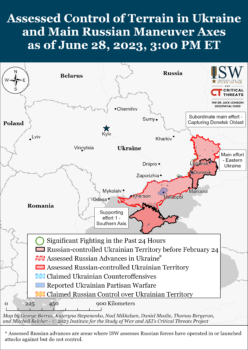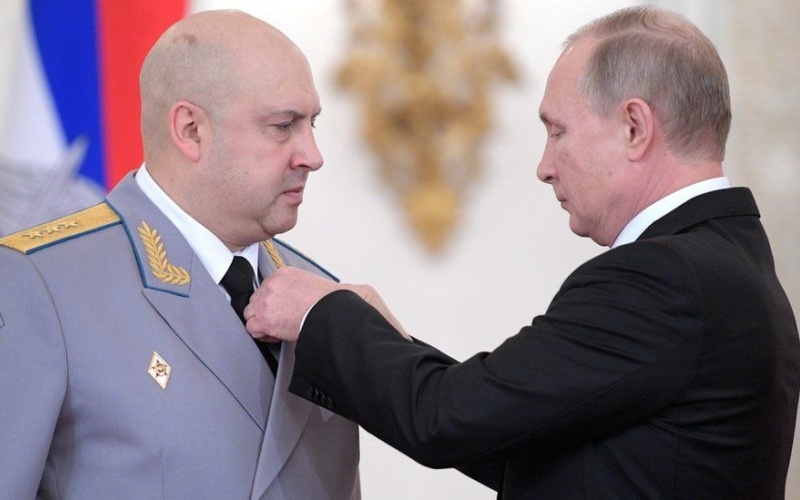Gen. Sergey Surovikin, decorated by Vladimir Putin for his command of Russian operations that killed thousands of civilians in Syria (Alexey Druzhinin/Sputnik)
Thursday’s Coverage: Kyiv’s Counter-Offensive Advances in South and East

Map: Institute for Study of War
UPDATE 1800 GMT:
Denmark has committed another 1.3 billion Danish kroner (about $198 million) in military support to Ukraine.
The package includes air defense missiles, ammunition, demining equipment, and funds for the purchase of artillery shells.
Acting Defense Minister Troels Lund Poulsen said:
It is absolutely crucial that we continue our support to Ukraine. This is a significant and important donation that we have put together based, among other things, on Ukraine’s wishes and needs. It is intended to support Ukraine’s ongoing defense against the Russian invading forces.
On Thursday, Germany delivered a TRML-4D air surveillance radar station, three Biber bridge layer tanks, a portable demining system, two border guard vehicles, and 16 Zetros off-road trucks.
UPDATE 1754 GMT:
Russian shelling has killed a teacher and the chief accountant of a school in the Donetsk region in eastern Ukraine.
Six other employees were injured in the school, part of which was destroyed, in the village of Serhiivka.
UPDATE 1749 GMT:
The Russian communications monitor Roskomnadzor has blocked media outlets linked to Wagner group leader Yevgeny Prigozhin, reports Russian newspaper Kommersant.
UPDATE 1124 GMT:
The Zelenskiy Government has pledged an enquiry after a Human Rights Watch report on Ukraine’s “apparent use” of banned anti-personnel landmines.
The report said troops used the mines in the liberation of Izyum in the Kharkiv region in northeast Ukraine.
Izyum was occupied by Russian forces on April 1, 2022. It was regained in early September by a Ukrainian counter-offensive.
HRW found Ukrainian forces fired PFM mines near Russian facilities. Use of the “butterfly mines” is banned under the 1997 Mine Ban Treaty, which Ukraine ratified in 2005.
Russia has also used antipersonnel mines in several areas, “but this doesn’t justify Ukrainian use of these prohibited weapons,” HRW said.
UPDATE 1106 GMT:
The governor of Russia’s Rostov region, Vasily Golubev, has played down local support for last weekend’s Wagner Group mini-rebellion.
The mercenaries captured the city of Rostov-on-Don, including the Southern Military Command headquarters, without firing a shot. When they left on Saturday, under a deal with the Kremlin, they were cheered and embraced by residents.
Golubev insisted that Wagner fighters had dressed up as residents to stage the celebration:
Not all of them were wearing their combat uniforms when they were in the city. That’s why [there were] those flags, and the hugs, too. It’s a deliberate story.
Golubev declined to answer a question about why it was “so easy” for Wagner to capture the city.
UPDATE 1038 GMT:
The World Bank has approved another $1.5 billion loan for Ukraine.
The loan, guaranteed by the Japanese government, will support relief to households, reforms to ensure transparency over public resources, and support for markets.
Antonella Bassani says, the World Bank’s Regional Vice President for Europe and Central Asia, said, “Ukraine has shown immense resilience in the face of Russia’s invasion….The World Bank will continue its unwavering support to help Ukraine recover and rebuild an even stronger economy.”
During Russia’s 16-month invasion, the World Bank has arranged more than $37.5 billion of aid, reaching more than 13 million Ukrainians.
UPDATE 0959 GMT:
The Russian investigative outlet Dossier Center has documents indicating Gen. Sergey Surovikin, the former commander of Vladimir Putin’s Ukraine invasion, was a secret VIP member of the Wagner Group mercenaries.
The documents list Surovikin, who has reportedly been detained by Russian officials after last weekend’s Wagner Group rebellion, alongside at least 30 other senior Russian military and intelligence officials.
A person “familiar with the situation” told Bloomberg that representatives of the military prosecutor’s office have been questioning General Surovikin for the “past few days”.
The source said Surovikin is detained in a specific location but is not in prison.
He added that the general is being treated “cautiously” as Russian authorities do not want to anger other military personnel.
UPDATE 0951 GMT:
Russian shelling has killed three civilians and wounded five in the Kherson region in southern Ukraine in the past 24 hours.
Governor Oleksandr Prokudin cited 72 Russian attacks with 434 shells from mortars, artillery, tanks, Grad rockets, and drones.
In Kherson city, the Russians struck residential areas, an aid distribution station, and a medical and educational facility.
UPDATE 0811 GMT:
As Ukraine’s counter-offensive in the south advances towards Berdyansk, there are explosions in the Russian-occupied port city this morning.
Ukraine’s General Staff says it struck the headquarters and storage depots of Russian troops in Berdyansk’s suburbs. Local Ukrainian officials reported 11 explosions and “fire and detonations in the airport area”.
Russian proxy official Vladimir Rogov said Ukraine fired UK-supplied Storm Shadow missiles on a target near the city, but claimed the explosions were from Russian air defense repelling the attack.
Didn’t realise storm shadow missiles had the ability to draw Z letters. This footage from occupied Berdyansk this morning. pic.twitter.com/FdZv0zkux4
— Oliver Carroll (@olliecarroll) June 30, 2023
UPDATE 0707 GMT:
Seeking leverage over support from the European Union’s recovery fund, Hungary’s Prime Minister Viktor Orbán — a long-time ally of Vladimir Putin — has rejected the EU’s further grants to Ukraine.
Orbán also said he is unwilling to contribute additional money to finance the EU’s increased costs of debt service.
One thing is clear, we Hungarians…will not give more money to Ukraine until they say where the previous around €70 billion worth of funds had gone.
And we find it utterly ridiculous and absurd that we should contribute more money to finance debt service costs of a loan from which we have still not received the funds we are entitled to get.
Recovery funds have been held up to Hungary and Poland over EU concerns about abuses of the rule of law in each country.
UPDATE 0652 GMT:
The Russian State has decided to assume formal control of the overseas operations of the Wagner Group mercenaries, according to sources speaking to The Wall Street Journal.
Russian Deputy Foreign Minister Sergei Vershinin reportedly flew to Damascus to tell Bashar al-Assad — propped up by Moscow throughout the 12-year Syrian uprising — that Wagner will no longer operate as an independent organization in the country. Mercenaries must now report to the Russian military base in Latakia Province in western Syria.
Russian Foreign Ministry representatives told Central African Republic President Faustin-Archange Touadera and Mali’s leadership that Wagner will continue operations in their countries.
Calling more than a dozen Wagner offices across, BBC journalists found recruitment of fighters continues: “From Kaliningrad in the west to Krasnodar in the south, no-one believed the group was being disbanded.”
But the head of the Duma Defense Committee, Andrei Kartapolov, said on Thursday that Wagner’s men will no longer fight in Ukraine after leader Yevgeny Prigozhin refused to sign contracts with the Defense Ministry.
ORIGINAL ENTRY: As Vladimir Putin tries to regain authority following last weekend’s rebellion by Wagner Group mercenaries, a top Russian general has reportedly been detained — and others may follow.
Multiple sources “familiar with the matter” told The Moscow Times and London’s Financial Times that Gen. Sergey Surovikin, a former commander of Putin’s invasion of Ukraine, has been arrested. Russian journalist Alexei Venediktov said on Thursday that Gen. Surovikin’s deputy, Col. Andriy Yudin, has been dismissed.
Some sources say Surovikin was seized last Saturday, during the 36-hour rebellion. He was arrested even though he appeared in a video the previous day, soon after Wagner fighters seized the city of Rostov-on-Don and advanced on Moscow, calling on them to lay down their arms.
One source said, “The story with [Surovikin] was not “OK”. [It was] for power. I can’t say anything more.”
Another added, “Apparently he [Surovikin] chose the side [of Wagner] and they grabbed him by the balls.” Asked where the general is now, the source replied: “We don’t even comment on this information through internal channels.”
Venediktov, editor-in-chief of the now-closed Ekho Moskvy radio station, posted on Telegram that Surovikin has not been in contact with his family for three days. A source confirmed, “There’s no contact with him, or with his guards, or his adjutant.”
Surovikin’s daughter insisted that “nothing [has] happened” and “everyone is at their jobs”: “[He] never appeared every day in the media and did not make statements.” Surovikin’s wife refused to comment.
Asked by reporters if the Kremlin could clarify Surovikin’s position, spokesman Dmitry Peskov said: “No, unfortunately not. So I recommend that you contact the Defense ministry: this is its prerogative.”
A journalist the asked if Putin still trusted Surovikin. Peskov evaded the question by supporting Shoygu and Gerasimov.
Analysts perceived Surovikin as close to Prigozhin. Last autumn, after a Ukrainian counter-offensive liberated territory and exposed the weaknesses of Russian forces, the general was appointed to head the invasion. Amid the power struggle between Prigozhin and the Russian Defense Ministry, he was replaced in January by Maj. Gen. Valery Gerasimov, the Chief of Staff of Russian armed forces.
The dismissal of Gerasimov and of Defense Minister Sergey Shoygu is one of Prigozhin’s central demands.
Purge?
Last Wednesday, US intelligence services used The New York Times to say Surovikin had advance knowledge of the Wagner Group’s mini-rebellion. Officials briefed on the intelligence said they were trying to establish if Surovikin helped plan Wagner’s dramatic, rapid takeover of Russian military headquarters in Rostov-on-Don and its advance on Moscow.
Significantly, US and Western officials said Prigozhin spoke of his plans to multiple Russian generals, and some may have backed the Wagner leader.
Russian military observers are also pondering the absence of Maj. Gen. Gerasimov since the mini-rebellion. Some are speculating that he has been replaced by Col. Gen. Mikhail Teplinsky, commander of the Russian Airborne Forces, although no announcement will be made until Putin’s position has been secured.


France uses armoured vehicles against their own people to control violent protests: https://www.barrons.com/news/france-says-police-to-use-armoured-vehicles-against-riots-554b410b?refsec=topics_afp-news
Paris suspends nightly public transport: https://www.barrons.com/news/paris-to-halt-bus-tram-services-daily-from-9-00-pm-authority-9e9315bf
Marseille bans all protests: https://www.devdiscourse.com/article/health/2506608-french-city-of-marseille-bans-protests-this-friday-after-latest-riots-in-france
France is reeling due to protests from pensioners, farmers and now ethnic minorities.
France is in chaos with massive protests and riots over the police shooting of a teenager
https://www.theguardian.com/world/2023/jun/30/france-riots-more-than-400-arrested-as-police-officer-accused-of-shooting-teen-apologises
Macron is holding crisis meetings and curfews have been imposed in many cities. This coming from the man who called the Iran unrest a “revolution” and lent his support to those claiming leadership of it: https://www.france24.com/en/middle-east/20221114-macron-calls-iran-protests-a-revolution-says-crackdown-harms-nuclear-deal-chances